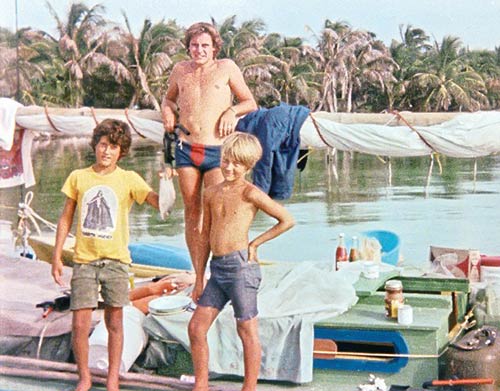September 17, 2019
While other boaters can present occasional trouble, the vast majority of cruising horror stories come from taking on crew; but I must add that in these cases, the danger isn’t so much about being harmed as it is about being annoyed. I’d title the crew-hiring scenario: “Annoying People Who Appear Normal.”
Any situation which throws complete strangers together into a living situation will inevitably bring clashes. After all, this is where many reality shows get their drama and entertainment value! This scenario is magnified out at sea people where people are together 24/7. What’s worse is that boat owners have their own way of doing things which the crew may not be willing, or able, to comply with.
Personality quirks get magnified, as do eating habits, drinking habits, sleeping habits, bathroom habits, decision making ability, meticulousness, etc. Really, bringing people you don’t know out onto the ocean with you creates a breeding ground for conflict. Unfortunately, bringing people you know doesn’t necessarily solve this issue: in fact it’s been said that if you want to lose a friend, bring them on as crew.
Impossible, annoying, crazy, duplicitous, irresponsible crew stories are so common that it’s amazing no compilation book of these stories exists (at least that I know of). Books like these written by nannies, airline personnel, nurses, celebrity assistants, etc. can become bestsellers and even movies. Such a book containing crew stories would be both horrifying and hilarious, I’m sure!
Thankfully we’ve never needed crew on Legacy, but we’ve certainly had people approach us, and a couple of them have been clearly unstable. In New Caledonia, we encountered one young American who’d planned to hitch a ride on a cruising yacht to New Zealand after finishing his temporary job. The problem: his job lasted late into the season and virtually all the cruising yachts had left. Someone (darn you whoever you are) told him that we were planning to head off soon; so he came by our boat wanting and expecting a ride. Rich patiently explained to him that we are a 2-person boat with one bed and do not take on passengers or crew. All Rich could suggest was that the young man post an ad on the bulletin board as boats do pass through the area late in the season.
The young man, dissatisfied, left, but the next morning he appeared again. This time I was in the cockpit. He marched up and stated, “Just let me sleep on your deck!” For a moment I had no idea who this was or what he was talking about—why would someone want to sleep on our deck? Then I realized he must be the pest from the previous day. I said no, then had to bark at increasing volume, “No!” several times as he kept arguing with me and insisting we take him with us. He finally left but was pretty miffed. After that we had to keep our boat locked in fear we’d come home one day to find him inside. It was a huge relief when we finally headed south (after carefully checking Legacy for stowaways).
Note to any Kiwis who don’t understand why crew can be a problem: Finding mentally stable, sober, and reliable crew is much easier in New Zealand in that, by law, Kiwis cannot captain their own boats offshore until they’ve actually experienced an offshore passage themselves. Thus, there’s a lot of good crew available (sailors anxious to get that required passage experience) and on top of that, they’re able to leave the yacht once it arrives at its destination.
This is perfect for those cruisers who want to deliver their boats to or from the tropics and have their families fly in to meet them. For those of us blue-water cruisers leaving from the Americas (North, Central and South), finding good crew is much more difficult, especially since said crew generally expects to stay with the boat once it’s arrived because cruising, not the passage experience, is often the reason they want to crew in the first place.
Of course the horror stories go both ways, and in fact none of the stories I’ve heard from the cruisers’ perspective have resulted in any fatalities or anything truly sinister. But from the opposite perspective, there are stories of crew and passengers who’ve been hurt or killed as a the result of incompetent or mentally unstable captains. In short, boat owners are far more deadly to crew than the other way around; so this will be the feature subject of this post.
c. Dangerous People Who Appear Normal, Part 2
The worst crew/passenger story we’ve heard was that of a young British couple, Peta Frampton and Chris Farmer, traveling around the world.

Chris and Peta had the misfortune to meet an American named Silas Duane Boston, who had a boat in the Caribbean. Silas probably seemed safe as he was running day trips off Belize and had two sons, age 13 and 12, aboard.

Silas was making the 150 mile trip from Belize to Honduras and was willing to take Chris and Peta along as passengers. Little did they know that Silas was, in fact, a serial killer who had already murdered his children’s mother. When Chris intervened as Silas was beating one of his sons, Silas waited and then took his revenge by murdering the couple and throwing them both overboard. It was many years before this murder was solved, and it’s believed this man has committed other murders since then.

Less drastic but no less fatal was a story we heard a few years ago from friends who’d been cruising in Fiordland (New Zealand). There were a handful of other boats visiting the area, and two young female backpackers had accepted a ride with one of them. The captain was European and one of those grizzled old salts who doesn’t pay attention to weather. He was also known among the other cruisers as a real jerk.
If memory serves, our friends tried to warn the girls about this man, but hey, he was offering a free ride and what an opportunity for them to see a remote area. So the girls went with him even though he was heading out into bad weather, and bad weather in Fiordland is nothing to be trifled with. Sadly but not surprisingly, the boat along with its captain and the girls, was lost in the treacherous waters off that southwest coast.
In our own experience, we were in Samoa when a young woman came up on the radio saying the boat on which she’d been crewing had an accident and she needed another ride. It turned out she was crewing on a boat with a rather notorious drinker who, in an inebriated state, had tried to anchor overnight off the north side of the island (there are no anchorages in that area because the bays are too reef-strewn). They had ended up on a reef and spent the night there with waves pounding on the boat.
Samoan officials rescued them the next morning and pulled the boat off the reef. Now, they were being towed into the marina. The young woman was immediately offered a ride to Tonga and later got another ride to New Zealand. She was OK but suffered some post traumatic stress disorder after the incident.
We never met her but we did meet the captain she’d been with, a nice guy but his drinking problem made him an unsafe skipper. Coincidentally we’d met another man in Tahiti who’d been trying to woo this girl, unsuccessfully, to his boat. That guy was both a drunk and a nutcase; so while she’d chosen the better of the two, both choices were bad.
The saddest story we know is of the four people who opted to crew on an old schooner called the Nina crossing from New Zealand to Australia. Along with the crew were the captain, his wife and their son. The boat was lost in bad weather during the trip with no survivors.
After reading the report New Zealand issued about the incident, it seems the boat was ill-equipped and not all that seaworthy. In my opinion, even though the captain was experienced, he wasn’t careful as not only didn’t he hire a weather router (probably because said router would have advised him not to leave when he did), he wrote this statement before they left: “The Tasman Sea is shooting gales out like a machine gun, living up to its reputation. We are shooting at heading out after the first one this week. No doubt we will be dancing with one or two of them.” Anyone who goes out in any boat, much less an old wooden schooner, with the expectation of “dancing” with gales on the Tasman Sea is a bloody idiot. I realize that sounds harsh, but it’s frustrating to look at the beautiful faces of that young crew and know their deaths were preventable.

Over the years Rich and I have talked to numerous crew in search of a boat and always try to steer them to trustworthy people. I especially worry about young women as they often end up with male single-handers who are often single-handing for good reason. We actually warned two girls in Fiji not to get on one boat for a planned day trip because it wasn’t seaworthy and the captain was a very heavy drinker. Thankfully, while the girls did go talk to him, they didn’t end up going anywhere on the boat. This boat eventually sank on a day trip out of the marina, headed to the same place its captain planned to take the girls.
I think one frustration for many of us cruisers is running across these young people who just assume anyone who owns a boat knows what they’re doing. They get stars in their eyes about making a trip with no thought as to the seaworthiness of the boat, the competency of the captain, or the degree of danger in the trip. They get into a “beggars can’t be choosers” mentality and are so grateful for a sailing opportunity they won’t look that gift horse in the mouth.
I used to have a fantasy about creating a website where cruisers could anonymously post warnings about dangerous vessels or captains. This site would be for the parents of young people, not so much the young people themselves as they tend not to heed warnings. If I were a parent who knew my traveling child might be looking to crew or hitch a ride on a yacht, I’d monitor such a website. But alas that will remain a fantasy as I can’t see anyone actually creating such a thing, or parents knowing enough to find it.
In the end, all I can think to advise anyone considering hitching a ride on a yacht as unpaid crew (being a professional crew member is a completely different matter), is to remember that while you’re becoming part of a team transporting a boat, that only you can look out for your own best interests.
It’s human nature that when joining a group, people shift their loyalties to that group. It’s tempting to put on blinders, but I’d advise that if your boat’s “team” is opting to leave when the vast majority of other boats has deemed a “weather window” unacceptable, or someone pulls you aside to warn you about a weather forecast, or problems with the boat, or problems with the captain, to please take heed of the warnings. You can do your own research about the weather or ask another cruiser to explain what they’re seeing. If you don’t want to believe one person who’s warning you about something, ask other cruisers for their thoughts—I’m sure you’ll be able to gather multiple opinions on the matter.
For women, make sure what’s expected of you is clear. Single males are often perfectly capable of delivering their boats themselves but may like female company, especially if that female company cooks and cleans. I don’t think I have to spell it out that some guys might want more. Make sure you know before you go, and keep in mind that even when everything seems well and good, some leopards can change their spots when they’ve been drinking heavily.
As for cruisers who want to take on crew, be sure you’re clear on your reasons. Are you doing it for yourself, or to please someone else like a nervous family member or advisers who’ve never done a blue-water passage in their lives? And if you’re trying to ease the watch burden on, say, your female partner, remember that as cook and maid (yes that’s sexist but it’s the way it usually works), her workload will now be doubled unless you bring on crew who can fix their own food and seem thoughtful and careful (in other words, a clean-up-after-themselves sort of person). Bringing on crew that makes life more difficult for your partner is hardly going to help convince them that cruising is a great thing.
I don’t mean to come off as negative about crew and crewing. Of course sometimes it all works out wonderfully as lifelong friendships are made and existing friendships are strengthened by the shared adventure. I guess my wish for both sides, whether it’s serving as crew or bringing on crew, is that they go into the deal with a clear head. In the end, trouble on one boat can ripple out and affect the cruisers around them, and that’s just no fun for anyone.–Cyndi
Other posts in the series:
Real Cruising Danger #1: Other Boaters (Part 1)
Real Cruising Danger #1: Other Boaters (Part 2)
Real Cruising Danger #1: Other Boaters (Part 3) (this post)
Real Cruising Danger #1: Other Boaters (Part 4)
Real Cruising Danger #1: Other Boaters (Part 5)
Real Cruising Danger #2: The Sheep Mentality






